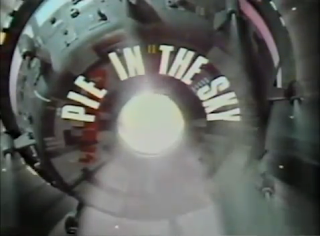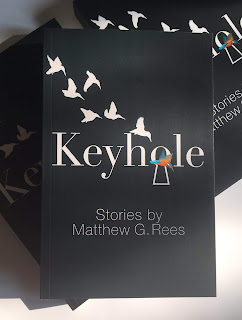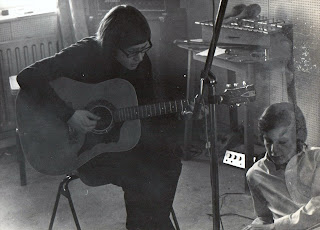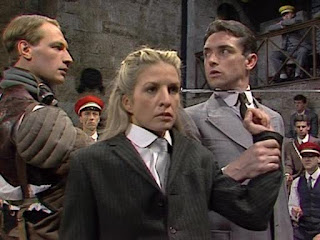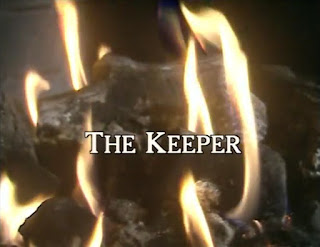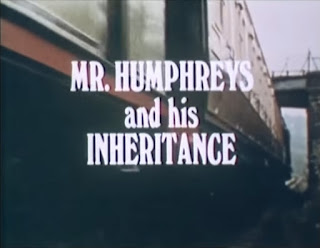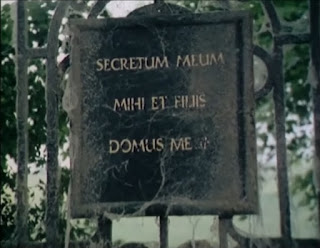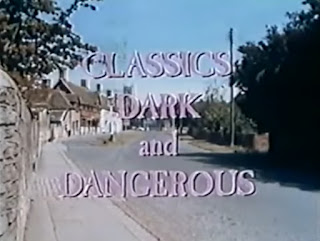Tuesday, 24 December 2019
M.R. James at Christmas
So, with this cavalcade of ghostly delights Wyrd Britain would like to wish you all a very merry Christmas.
..........................................................................................
If you enjoy what we do here on Wyrd Britain and would like to help us continue then we would very much welcome a donation towards keeping the blog going - paypal.me/wyrdbritain
Sunday, 15 December 2019
The Terror
The Terror tales the story, from the perspective of the inhabitants of a small, rural Welsh community, of an uprising of the natural world as villagers are dying in mysterious circumstances. We are placed in the company of Dr. Lewis as he investigates the deaths and learns more of similar events around the country.
You can see it's influence in works such as Daphne du Maurier's 'The Birds', M Knight Shyamalan's 'The Happening' and even in the 'when animals attack' horror sub genre of the 1980s by the likes of Guy N Smith and Shaun Hutson but please don't expect the visceral carnage of the later though as Machen is a far more lyrical author. Here he keeps the terror at arms length, we rarely see it's immediate impact arriving after the fact with only clues to lead us to the truth of the matter that is slowly teased out around the more fanciful theories of one of Lewis' club mates.
Personally I have a preference for Machen's more folkloric and overtly supernatural work and as such 'The Terror' isn't a tale I return to particularly often but there is a real dearth of Machen adaptations out there and so to find this early 80s (New Year's Eve 1981 to be precise) radio play was an unexpected treat too good not to share with you all.
..........................................................................................
If you enjoy what we do here on Wyrd Britain and would like to help us continue then we would very much welcome a donation towards keeping the blog going - paypal.me/wyrdbritain
Friday, 13 December 2019
Lanny
Max Porter
Faber
There’s a village sixty
miles outside London. It’s no different from many other villages in
England: one pub, one church, red-brick cottages, council cottages and a
few bigger houses dotted about. Voices rise up, as they might do
anywhere, speaking of loving and needing and working and dying and
walking the dogs.
This village belongs to the people who live in
it and to the people who lived in it hundreds of years ago. It belongs
to England’s mysterious past and its confounding present. But it also
belongs to Dead Papa Toothwort, a figure schoolchildren used to draw
green and leafy, choked by tendrils growing out of his mouth.
Dead
Papa Toothwort is awake. He is listening to this twenty-first-century
village, to his English symphony. He is listening, intently, for a
mischievous, enchanting boy whose parents have recently made the village
their home. Lanny.
Max Porter hit big the other year with his debut novel, 'Grief is a Thing With Feathers' a poetical meditation on loss with an absolutely devastating finale. For his second novel loss - of a different sort - also takes centre stage wrapped up in a tale of a young boy and his love of his home, peripherally of Dead Papa Toothwort the genius loci of that place and crucially, as with the previous book, how loss and grief is dealt with by those left behind; an exploration writ large in the a middle section formed from an almost stream of consciousness bite sized narrative plucked from the thoughts and conversations of the various villagers.
Very much a book of three parts with Porter employing three different devices to tell his tale. The opening section uses the same format as his previous novel giving each character a monologue or vignette from which we can build the story, the second is the whirling schizophrenic cut-ups whilst the third is a more traditional story form albeit one that is largely based in illusion as Dead Papa Toothwort takes the role of game show host. I enjoyed the perspective shifts enormously although I will say if you are familiar with Porter's debut then the first section is a recognisable, and possibly over-familiar, tool.
The book as a whole is a shining experience. Transformative, playful and desperately serious. It's consistently readable even when flipping it's structure on it's head and holds it's more esoteric elements in just enough abeyance to make you wonder at their legitimacy whilst being entirely certain of their impact.
Buy it here - UK / US
..........................................................................................
If
you enjoy what we do here on Wyrd Britain and would like to help us
continue then we would very much welcome a donation towards keeping the
blog going - paypal.me/wyrdbritain
Wednesday, 11 December 2019
The Occult: Mysteries Of The Supernatural (1977)
Following the fabulously groovy opening titles witches, astrologers, mediums, astral projectors and spoon benders in very fetching pyramid hats all get some airtime alongside clips from classic horror movies with Lee keeping his commentary just on the diplomatic side of bemused scepticism.
You're not going to learn anything here but it is a fabulous slice of history that entirely feels like one of those coffee table books of the supernatural and the unexplained that were all the rage at the time.
..........................................................................................
If you enjoy what we do here on Wyrd Britain and would like to help us continue then we would very much welcome a donation towards keeping the blog going - paypal.me/wyrdbritain
Monday, 9 December 2019
Lies Sleeping
Gollancz
Join Peter Grant, detective and apprentice wizard, for a brand new case . . .
Martin Chorley, aka the Faceless Man, wanted for multiple counts of murder, fraud, and crimes against humanity, has been unmasked and is on the run. Peter Grant, Detective Constable and apprentice wizard, now plays a key role in an unprecedented joint operation to bring Chorley to justice.
But even as the unwieldy might of the Metropolitan Police bears down on its foe, Peter uncovers clues that Chorley, far from being finished, is executing the final stages of a long term plan. A plan that has its roots in London’s two thousand bloody years of history, and could literally bring the city to its knees.
To save his beloved city Peter’s going to need help from his former best friend and colleague–Lesley May–who brutally betrayed him and everything he thought she believed in. And, far worse, he might even have to come to terms with the malevolent supernatural killer and agent of chaos known as Mr Punch.
Last time out we finally got to know the identity of the Faceless Man as the web of deceit he had woven around his true identity came crashing down in the most brutal way. Now he's on the run and the residents of The Folly and the rest of the forces of the Fuzz are hot on his trail.
Along the way Peter gets to spend some time with the Thames clan, the Folly gets some unexpected new recruits and there's an unexpected, and rather lovely, reunion before everything that's been building over the rest of the series comes rushing to a head.
Now, I really hope there's more here than we've seen so far as as a climax to a 7 novel (plus assorted comics and novellas) it's a tad underwhelming. It's lively and readable and filled with warmth and humour as is always the case with Aaronovitch but just a tad anticlimactic. Hopefully though he has something up his sleeve and as ever I'm eagerly awaiting the next instalment.
Buy it here - Lies Sleeping
..........................................................................................
If you enjoy what we do here on Wyrd Britain and would like to help us continue then we would very much welcome a donation towards keeping the blog going - paypal.me/wyrdbritain
Saturday, 7 December 2019
Uncanny Stories
Wordsworth Editions
May Sinclair was an innovator of modern fiction, a late Victorian who was also a precursor to Virginia Woolf. In her Uncanny Stories (1923), Sinclair combines the traditional ghost story with the discoveries of Freud and Einstein. The stories shock, enthral, delight and unsettle.
Two lovers are doomed to repeat their empty affair for the rest of eternity... A female telepath is forced to face the consequences of her actions... The victim of a violent murder has the last laugh on his assailant... An amateur philosopher discovers that there is more to Heaven than meets the eye.
Specially included in this volume is The Intercessor (1911), Sinclair's powerful story of childhood and abandoned love, a tale whose intensity compares with that of the Brontës.
I first came across May Sinclair a few months back in the 'Mortal Echoes' anthology from The British Library which featured her story 'Where Their Fire Is Not Quenched' a truly terrifying tales of a very personal Hell. Not long after that I watched the TV adaptation of her 'Intercessor' which was a rather beautiful ghost story about loss, blame and guilt. I was already hooked after the former and by the end of the second I was besotted. As it happened sat unread on a shelf here I had this collection of her work so I happily waded in.
Following what seems to have been a fairly difficult childhood and a problematic relationship[ with her mother, Sinclair took to writing to support them at a time when she was also becoming an active supporter of the women's suffrage movement. All these factors have a presence in her stories where independent and sexually liberated women find themselves at the mercy of oppressive control either from family, tradition or religion.
Those two previously mentioned stories bookend this collection and do so in a manner that shows the extremes of her tales; the cruel, inescapable brutality of the former and the poignant delicacy of the latter joined by the quality of the prose.
Between the two reside various shades of fear with the standout moment being the psychic shenanigans of 'The Flaw in the Crystal' that, with it's lead character of a confident and sexually liberated young woman is a real breath of fresh air although that's not to belittle any of the remaining five stories. Admittedly some, like 'The Token' are a little slight but they don't hang around and make for nifty quick reads between the more developed tales.
Sinclair's supernatural output was small but substantial and it's a shame that she isn't better regarded as stories like 'Where Their Fire Is Not Quenched' have a timeless quality that still resonates.
Buy it here - Uncanny Stories (Wordsworth Mystery & Supernatural) (Tales of Mystery & the Supernatural)
..........................................................................................
If you enjoy what we do here on Wyrd Britain and would like to help us continue then we would very much welcome a donation towards keeping the blog going - paypal.me/wyrdbritain
Wednesday, 4 December 2019
3 Wyrd Things: Robin the Fog
 |
| photo by Victoria Hastings |
Robin is a musician, sound artist and radio producer based out of London, often working under the name Howlround he works with several, lovely, old (and slightly unreliable) tape machines to produce beautifully hazy lazy loop based music.
Robin's website can be found here.
...................................................................................
Book
The Boy With Illuminated Measles
John Antrobus
Behind the desk sat a man in a white suit. Round his neck hung a sign which read: “GONE TO LUNCH”. He was munching on a ham sandwich.
“Ah”, said Doctor Halibut, “I see Sir Rodney has gone to lunch. Never mind, he’ll be back soon”. “No I won’t”, said Sir Rodney from behind the desk, “I’ve got another half hour yet”.
One morning a boy called Ronnie wakes up feeling rather unwell. Good, he thinks, no school today and immediately feels better. Examining himself in the mirror, he discovers that he is suffering from a most unusual case of measles, his face covered with spots of different colours all flashing on and off like lights on a Christmas tree. His mother had planned to take him to the doctors, but she is accidentally blasted into space inside the elevator she uses to get upstairs - Dad having replaced the staircase with an escalator moving in the opposite direction. Ronnie is forced to head to the surgery on his own. In the waiting room he attracts the unwanted attention of Mr. Sloane, a suspicious old man who is almost certainly a Russian spy and keeps speaking into his shoe. This is all in the first 10 pages…
“Illuminated measles are like the Loch Ness Monster”, continued Sir Rodney, “You get the occasional report of a sighting - from Ealing, mainly - but you can’t get the facts. I should know. I've written three books on the subject”
Escaping from the doctor’s surgery after deciding that he didn’t want his measles cured after all, Ronnie is pursued by Mr. Sloane and his Russian spy comrades, who have convinced themselves that he is some sort of new secret weapon disguised as a small boy. The chase takes him, somewhat implausibly, to an iceberg where he bumps into a troop of elderly musicians playing old-time dance music for a tribe of Eskimos…
Could it possibly be, thought Ronnie, that these musicians were from the Titanic? A big ship that had sunk many years ago when it struck an iceberg? Ronnie’s father had told him all about that terrible catastrophe of long ago and of how his great grandfather had survived the disaster. (His great grandfather had survived it by never going to sea: in fact he had made a point of always staying at least thirty miles inland. He had also survived the Great Rumanian [sic] earthquake at the turn of the century, because he was in England at the time. He had survived Captain Scott’s expedition to the South Pole by not going on it. In fact, he had not even been asked…)
At this point it’s probably not too much of a spoiler to inform you that further plot developments include Ronnie being swallowed by a whale and winning an Oscar, but I’ll stop there and let you discover the rest of this beautifully ridiculous children’s story for yourselves. Written in 1978 by John Antrobus, a veteran comedy writer perhaps best known for his collaborative work with Spike Milligan, a copy of The Boy With Illuminated Measles was given to me years later as a birthday present by an art student who was lodging with my family at the time. Reading it again now for the first time in years, I realise just how many of the jokes went over my 8 year old head, but I loved the silliness and absurdity of it all. The illustrations by Rowan Barnes-Murphy play a big part in telling the story as well, exuberant doodles filling every scrap of the page that isn’t taken up with text. The image of the Titanic’s band jamming together on a giant snowball (complete with timpani and grand piano) while a group of Eskimos joyously breakdance in the foreground is particularly glorious. Unfortunately, their happiness is short-lived as the musicians realise Ronnie’s flashing measles would make a perfect set of navigation lights and promptly make good their escape.
The Chief Eskimo burst into tears “Our band! Our lovely band! Our beautiful light music!” he cried. “Ah, well, nothing lasts forever. The only constant thing is change”.
There are supposedly four other books about Ronnie and his adventures, but I’ve yet to come across them. Frankly, I’m amazed John Antrobus could think of anything left to happen after having the US and the Soviet space programmes join forces to rescue Ronnie’s orbiting mother…
Music
Catch 22-20
‘Technics SL-P202A compact disc player. 4 times oversampling high resolution system digital filter. 2D/IC linear 18-bit random access program. recorded direct to DAT 1997 no edits. no user-serviceable parts inside. refer servicing to qualified service personnel. Limited pressing of 500 copies’.
A rather prosaic introduction to what is almost certainly the single strangest record in my collection, beating off stiff competition from Plus-Tech Squeeze Box’s stupendously maximalist CARTOOOM!!!!, the sugar-coated, edited-with-a-bag-of-hammers frenzy of Muhammad Ali vs. Mr. Tooth Decay, the oxygen-rich Earth-child wibblings of A Chant For Your Plants or the grubby, creaky bedsprings of Midnite Cowpoke. Released in 2002 as a one-sided 12” on RAFT Records, ‘Catch 20-22’ purports to be a single, unedited recording of a CD player attempting to play a well-known piece of music (the identity of which only becomes apparent after several minutes), but doomed to skip back and forth over the same short section over and over again, thanks to some sort of obscure malfunction. However, rather than the usual ‘tik-tik-tik’ sound we might expect from a skipping compact disc (perhaps through some quirk attributed to the ‘4 times oversampling high resolution system’ mentioned above), the machine’s incessant efforts to get back on track and play the disc correctly occasionally lead to some small progress, injecting an element of unpredictability into the mix. Gradually new notes and sections of the music are revealed, a tiny fragment at a time before cycling through the entire process anew - the digital equivalent, perhaps, of ‘one step forward, two steps back’. But here’s the rub: during all of this, in an act of utterly wondrous serendipity, the skipping of the CD remains completely in time with the beat of the music.
Even now playing this record is something of an endurance test. It’s roughly fourteen minutes in total, but ends in a locked groove (which also happens to be in exact sync with the music, stretching the limits of plausibility still further), meaning that unless you physically stop the disc the piece could go on into infinity - or until the turntable breaks, though it’s entirely likely that the listener will collapse first. What was formerly a famous piece of light orchestral pop is now digitally scrambled before your very ears into a keening, wheedling melody that burbles incessantly over a frantic lockstep rhythm for ten sanity-sapping minutes. By this point, you’ll probably be wondering if time itself has got stuck, not just the CD. But then all this is then suddenly blown into oblivion by an extended blast of digital scree, followed by a few seconds of absolute silence. For a moment it seems that the experiment is over, but then the track suddenly blazes back into life, swings into a bombastic chopped-up drum solo and we’re off again. It’s astonishing how much it sounds like there’s a genuine agency behind the way this piece falls together, but we’re told this is an unedited, aleatoric recording and I believe it.
As a listening experience it’s utterly maddening, like an amphetamine-blasted Benny Hill chase sequence without end or respite. I’ve known it cause listeners to both howl with laughter and plea desperately to make it stop - often in the same sitting. Also like Benny Hill, there’s something confoundedly British about the whole heroic folly – the rictus grin of a Duracell Bunny smashing away at the remnants of his drum, a frantic plate-spinning act by some senile end-of-the-pier conjurer, where the plates are both endlessly spinning and endlessly shattering.
My copy was given to me by RAFT label-owner Howard Jacques one evening at Resonance FM and to this day listening to it reminds me of late nights spent at the station’s Denmark Street HQ in the early 2000s (before the ceiling fell in) having my ears opened and my mind expanded. Outside of Resonance they weren’t always the happiest years, professionally or personally, but Catch 22-20 taught me the most valuable lesson in embracing chance, serendipity and failure as part of the creative process – and made me cry laughing too. I still find it incredible that this record isn’t better known. Mint condition copies can be found on online vinyl database Discogs for a mere couple of pounds. I’ve got two of my own and if after purchase you decide you can’t bear having a copy in your house I can always use a third.
TV
See Saw
Doubtless the revelation that I spent a good chunk of my formative years watching weird old kids TV will come as a surprise to absolutely nobody - who amongst us didn’t? Great reams of online content have already been generated on this subject over the last couple of decades, so for our purposes here today I’ve chosen a couple of extracts from the long-running See Saw strand of BBC programming (formerly known as Watch With Mother) that seem to have thus-far avoided being picked too clean by other hauntological hands.
The first, Chockablock, was a lurid mix of primary colours, flashing lights, vintage computer graphics and proto-chiptune music - including that memorable bontempi-bashing theme tune. Each episode was crammed with all manner of cheery electronic bleeping, squelching and burping noises, mixed with primitive animation and some basic chromakey special effects, all served up by a giant mainframe-style computer with a big reel to reel tape machine mounted on the front to look like eyes in a benignly smiling face. I probably wouldn’t need to draw too much of a map between watching this show as a child and all of my subsequent longstanding musical obsessions, starting with the moment in late 1991 when I saw Altern 8 making very similar noises on Top of the Pops and suddenly realised in some obscure way that this was what I wanted to do. Plus ‘Chocka-Girl’ Carol Leader was my first crush: in Chocka-World girls wore jumpsuits and drove around in tiny little electric cars to the strains of calliope music. What red-blooded man could resist?!
Until the arrival of youtube, I was convinced that the second, Pie in the Sky, was nothing more than some sort of chickenpox-related fever dream. Making sense of this short-lived and extremely bizarre piece of pre-school edutainment is a tall order even as an adult, so I’ll leave the exposition to the programme’s introductory voiceover: the following words were dramatically intoned at the beginning of each episode, with a gravitas that grew steadily more intense as the Poundland-Prog sig tune swelled to a crescendo:
‘Once there was a Pieman and his wife who sang as they baked their pies. The smell of their pies and the sound of their singing carried beyond Earth through outer SPACE! To the planet PIE!! And THEN, from out the sky, came a PIESHIP!! A PIE IN THE SKY!!! Its MISSION!! To beam a dish down to Earth to be FILLED WITH SONGS FOR THE CHILDREN OF PIE WHO HAD NONE OF THEIR OWN!!!!’
Got all that? Oh, to have been a fly on the wall during that commissioning meeting! One can readily imagine some 1980s office at BBC Television Centre, presumably downwind of the canteen, in which an emaciated producer mumbles ‘It’s about a spaceman who likes pie so much that he travels to Earth in a spaceship looking for more pies. And all the pies have songs inside them, did I mention that? And his helmet is a pie. And his spaceship is a pie as well… Sorry, I understood lunch would be included?’
The commissioning editor must have been hungry too, because rather than having the producer escorted from the building, they duly commissioned 13 episodes for broadcast in the Autumn of 1986 (presumably after that the unhappy children of Pie just had to go without). The stars of Pie In The Sky (or perhaps more accurately the people the camera is mostly pointed at) are two characters known as Pieman and Piewife, a married couple who live on Earth and run a bakery together, but are somehow still not on first-name terms. In each episode a mysterious alien force commands the duo to bake them a very special pie filled with a song – a concept apparently so rudimentary it requires no further clarification. And as the pie-loving pair begin to carry out this most peculiar of tasks, the scene cuts away to an extended musical number where the cast give the song in question - generally a well-known nursery rhyme – what can only be described as a thoroughly good drubbing.
Gentle reader, there are few folk in this universe of ours that I dislike more than the kind of hardened cynic that would roll their eyes at such lowly-budgeted toddler-fodder as Pie in the Sky and sneer something like ‘what the hell were these people ON?!’ Yet in spite of this, I cannot accept that anyone in full possession of their faculties could sit through FOUR LONG, LOUD MINUTES of ‘Sing a song of sixpence’ without coming to the unshakable conclusion that everyone involved was under the influence of some kind of psychoactive substance. Exhibit A: the moment about two thirds into the song where a man dressed as a woman is suddenly mutilated by a hand puppet while the others gurn manically behind plastic animal snouts. Then everyone just starts screaming. Exactly what kind of a dainty dish is this?!
Anyway, once each of these musical numbers have been sucked into the centre of a freshly baked pie (again, the science behind all of this was rather brushed over), the resulting dish would be magically beamed up to an orbiting ‘Pieship’ and into the care of a castrato in a pastry helmet known as the Pie Pilot, who would transport it far across space for consumption by the grateful denizens of the Planet Pie. We learn very little about the Planet Pie throughout the series, though it appears to be home to a greatly advanced civilisation that has a solid mastering of interstellar travel, if not of basic logistics (ie. why not just make one trip to Earth and order several pies simultaneously, thereby saving on Pieship mileage?).
Yet for all their futuristic technological sophistication, the proud people of Pie seem to have two simple lodestars in their lives: they like pastry and they like nursery rhymes performed VERY LOUDLY. And while they may be light years ahead of us in their conquest of space and their development of the tractor beam, those two simple pleasures seem to be completely beyond them. What a terrible irony it must be to dwell on a planet named after something the entire population desperately wants but can’t have. And so across the gulf of space, minds immeasurably superior to ours regarded this Earth with envious eyes, and slowly and surely, they drew their plans against us. These plans chiefly involved sending a guy with a squeaky voice crisscrossing the galaxies to capture our songs and have them wrapped in a flaky, buttery crust. All sounds ridiculously implausible until you remember that Max Tundra once issued a full-length album in a can of kosher chicken soup. ‘Soup in the Sky’ might make for quite an intriguing sequel, if I can just find a sympathetic commissioning editor.
I may have over thought all this. But thanks to youtube I know I wasn’t hallucinating.
..........................................................................................
If you enjoy what we do here on Wyrd Britain and would like to help us continue then we would very much appreciate a donation towards keeping the blog going - paypal.me/wyrdbritain
Saturday, 30 November 2019
Keyhole
Three Impostors
Several writers, Arthur Machen among them, have spoken of their certainty of our co-existence with another world – one that we are close to in our daily lives and from which we are separated by the finest partition; a place of ancient forces and wisdom, and darker, more peculiar things.
'Three Impostors is a publisher based out of Newport, South Wales that takes it's name from the work of Arthur Machen - born and raised in the nearby town of Caerleon - and which has at it's heart a desire to further explore those fertile lands that the master so beautifully chronicled.
Rees' debut collection offers us keyhole peeps into an other land, an other Wales in actuality which is the cause of my only complaint with what is an otherwise excellent collection as it does lend a slightly parochial feel to the proceedings that raises the spectre of the type of worthy Welsh literature that was inflicted on some of us unlucky souls in our schooling. Such feelings are fleeting though as what raises 'Keyholes' is Rees' lively prose and an imagination as bright and colourful as the kingfishers that swarm around the head of the young lady of the books' title piece.
Within the covers of the book Rees takes us to places where pensioners wager their teeth, where the spirits of soldiers stalk the hills, where men float through and away from life, where revenge, comeuppance, grief and humour are all in evidence and where the pub is the ultimate refuge.
This is a hugely recommended collection that marks Rees out as a writer capable of spinning tales of vibrant imagination and who is unafraid to peer into stranger places.
Available from the publisher at the link above (tell them Wyrd Britain sent you)
..........................................................................................
If you enjoy what we do here on Wyrd Britain and would like to help us continue then we would very much welcome a donation towards keeping the blog going - paypal.me/wyrdbritain
Tuesday, 26 November 2019
Other Edens
Robert Holdstock (ed)
Unwin
This 1987 collection of sci fi and fantasy shorts was produced to address a perceived gap in the availability of a mass market anthology collection at the time. A hark back to the myriad of books of shorts that covered book shelves of the 1970s. It went on to spawn two sequels over the next two years. This first one boasting a line up entirely consisting of UK based - not necessarily British - authors proved to be an enjoyable if slightly inconsistent read.
The standout story here is Robert Holdstock's 'Scarrowfell'. Having just emerged from his 'Mythago Wood' I was enthused to read more and it certainly delivered with another piece of pagan Celtic fantasy that felt both uncontrived and remarkably fresh.
I'm a huge Michael Moorcock fan so the biggest disappointment here is undoubtedly his 'The Frozen Cardinal' which I thought was just daft although the treatment of women in many of the tales was an equally disappointing experience with both Tanith Lee's 'Crying in the Rain' and Christopher Evans' 'The Facts of Life' reducing them to mere property and Lisa Tuttle's 'The Wound' to that of a mutation.
Ian Watson's 'The Emir's Clock' is an interesting piece with a dumb ending and R.M. Lanning's 'Sanctity' was an interesting set up to an ending that reminded me of Monty Python joke and David Langford's ' In a Land of Sand and Ruin and Gold' owed a real debt to Moorcock's 'Dancers at the End of Time' series.
Graham Charnock's 'Fulwood's Web' was an entertainingly old fashioned bit of 'man shouldn't meddle' fun. David Garnett's 'Moonlighter' gave a tweak to the hoary old parallel dimension trope whilst M. John Harrison's 'Small Heirloom's' was intriguing but needed far more room than it had here. Gary Kilworth's 'Triptych' was one interesting idea sandwiched between two lesser ones but Keith Roberts' 'Piper's Wait' was very much the redemption of the book's latter half.
As I said an inconsistent read redeemed entirely by Holdstock's tale but not without a smattering of other interests strewn across it's pages.
..........................................................................................
If you enjoy what we do here on Wyrd Britain and would like to help us continue then we would very much welcome a donation towards keeping the blog going - paypal.me/wyrdbritain
Sunday, 24 November 2019
A Child's Voice
"Radio fixes the person, but frees the imagination... and the people most affected by it were those who lived and listened alone."
His latest reading tells of a young magician's assistant who dies trapped inside a vanishing cabinet and whose ghosly voice torments the magician unto death. It's after telling the first part of this tale that his life begins to mimic his art as he receives a midnight telephone call from a child asking him not to finish the story.
"The Story you are reading. I would prefer you to go no further with it. It troubles me a great deal."
Mckenna is an always reliable presence and the fabulously portentous narration by (The Hitchhiker's Guide to the Galaxy's 'Deep Thought' and Doctor Who's 'The Black Guardian') Valentine Dyall is a real treat. It's a fine low key and affecting tale that uses it's simple premise and obviously minuscule budget well although it does miss it's natural ending and continues on for just a couple of minutes too long.
The poor quality of the film serves, I think, to add to the unsettling ambience of the tale as we're left to decide whether this is the story of something breaking through or of someone breaking down.
..........................................................................................
If you enjoy what we do here on Wyrd Britain and would like to help us continue then we would very much appreciate a donation towards keeping the blog going - paypal.me/wyrdbritain
Monday, 4 November 2019
Alice Through the Looking Glass & White Rabbits in Sussex
The duo were also responsible for one particular beautiful oddity when they composed the 'soundtrack' for The Ditchling Players 1969 amateur performance of Lewis Carroll's 'Alice Through the Looking Glass'. Originally only released as a private press (50 copies) on Howell's own label it is the single most perfect audition tape he could ever have made for his later employers; full of odd instrumentation and tape experimentation it's pastoral folk experimentalism meaning it's every bit as eccentric and idiosyncratic as both the source material and his future workplace.
You can hear the album in the embedded player below and whilst it may not be to everyone's taste I encourage everyone to give it a try as personally I think it's fabulous but before you do please also allow me to point you in the direction of a fantastic 30 minute documentary on the album produced by BBC Radio 3 a couple of years back.
Presented by David Bramwell it tells the story of the album and beyond that of the influence of the landscape of the Sussex Downs with the participation of the two composers, some of the Ditchling Players themselves and musical luminaries such as Shirley Collins and Arthur Brown. It really is very much worth 30 minutes of your time and can be heard at the link below...
White Rabbits in Sussex
And then there's the album itself...
..........................................................................................
If you enjoy what we do here on Wyrd Britain and would like to help us continue then we would very much appreciate a donation towards keeping the blog going - paypal.me/wyrdbritain
Sunday, 3 November 2019
Night of the Big Heat
Set on the island of Fara where despite it being winter the locals are suffering in an intense heat wave. Onto the sweltering island comes vampish secretary, Angela Roberts (Jane Merrow) in an attempt to rekindle her affair with novelist / publican Jeff Callum (Patrick Allen). Already on the island are various locals including Dr Vernon Stone (Peter Cushing), a team of meteorologists and a brash scientist called Godfrey Hanson (Christopher Lee) who is investigating the heatwave and uncovering some unexpected results.
Directed by Hammer stalwart Terence Fisher (The Curse of Frankenstein, Dracula) and starring that companies two biggest stars - although Cushing is very much a supporting cast member here - it seems strange that this was made by the obscure Planet Film Productions but perhaps that goes a long way to explaining just how cheaply made it seems but continuity errors and dodgy effects are the stuff that all our favourite B-movies are made of and this is definitely a B (possibly even a C).
The film is often achingly slow being a creature feature with an uninspiring creature that resembles a stranded jellyfish and with a script that was, at least in part, written by Pip and Jane Baker - more familiar for their work some 20 years later on Doctor Who - this is a film that is saved by it's cast as Lee is obviously relishing his role, Cushing dominates each of his few scenes and Merrow is deliciously vindictive as the bonkers femme fatale.
In all it's a mess but it's a mess with Christopher Lee and Peter Cushing at it's heart and that's a pairing that is always going to make me happy.
Buy it here - UK
..........................................................................................
If you enjoy what we do here on Wyrd Britain and would like to help us continue then we would very much appreciate a donation towards keeping the blog going - paypal.me/wyrdbritain
Friday, 1 November 2019
The Vorpal Blade
Told in flashback Cushing himself appears only in the the framing sequence and as the narrator and whilst age may have robbed him of the physicality he used to bring to his performances it certainly has had no effect on the grandeur of that voice.
With it's title taken from the name Lewis Carroll gave to the magical blade that slays The Jabberwock in his nonsense poem featured in 'Through the Looking Glass', Cushing here tells the tale of a schoolboy duel; of jealousy, of pride and of fear. He tells of a time in 'his' younger days when he was forced to fight a duel and of the consequences of the decisions and actions of the participants.
The story he relates is, in all honesty, a little weak and the final revelations are easily deduced long before they are played out but a chance to catch one of the final performances - he was to act on screen only 5 more times after this - of one of the greats of wyrd British cinema is not to be passed on.
..........................................................................................
If you enjoy what we do here on Wyrd Britain and would like to help us continue then we would very much appreciate a donation towards keeping the blog going - paypal.me/wyrdbritain
Sunday, 27 October 2019
Night of the Demon
Made by the French director Jacques Tourneur (who had previously made the fabulous 'Cat People') ''Night of the Demon' is an early entrant into what has become known, perhaps slightly clumsily, as folk horror and certainly set the scene for many a Hammer and Amicus film to come in the next decade and a bit. Standing stones, (references to) witchcraft, black magic, rural landscapes and runes all feature prominently but the film is made with a master's eye for atmosphere conjuring malevolence even in broad daylight as in the garden party scene - later perhaps to find an unlikely homage in the video for UK prog rock band Marillion's video for their song 'Garden Party'.
Beyond the technical skills of the director 'Night of the Demon' features fantastic performances by all involved. MacGinnis is superbly understated as Karswell equally at home delivering his blase threats (and curse) against Holden as he is gently dealing with his 'wayward' mother's (Athene Seyler) attempts to help the same. Andrews is almost smotheringly pompous in the lead role as his brash and rational new world confidence comes crashing into old world irrationality helped only by the presence of his murdered colleague's niece (Peggy Cummins) whose scientific education matched with her British heritage allows her to straddle both worlds..
There's some dispute over the demon itself, was it's appearance always planned or was it inserted at the insistence of producer Hal E. Chester and should it even be seen at all. Personally I come down on the side of those who would rather not have seen the beast but I do wonder if that's partly because this was a film that eluded me as a youngster and so I first saw it when the teenaged metalhead version of me in his Slayer T-shirt was already becoming a distant memory but he would have bloody loved seeing the demon.
Buy it here - Night of the Demon (1957) [DVD]
..........................................................................................
If you enjoy what we do here on Wyrd Britain and would like to help us continue then we would very much appreciate a donation towards keeping the blog going - paypal.me/wyrdbritain
Tuesday, 15 October 2019
Mortal Echoes: Encounters With the End
British Library Tales of the Weird
A strange figure foretells tragedy on the railway tracks. A plague threatens to encroach upon an isolated castle. The daughter of an eccentric scientist falls victim to a poisonous curse.
Yet for all its certainty and finality, death remains an infinitely mysterious subject to us all. The stories in this anthology depict that haunting moment when characters come face to face with their own mortality.
Spanning two centuries, Mortal Echoes features some of the finest writers in the English language – including Daphne du Maurier, Edgar Allan Poe, Graham Greene and H. G. Wells. Intriguing, unsettling and often darkly humorous, this collection explores humanity’s transient existence, and what it means to be alive.
Another in the series of ghoulish tales from the British Library. They've done about a dozen of these over the last little while and I thought it was about time I got properly stuck into them. The first one I read (Glimpses of the Unknown) was a fun excursion into the lesser known corners of the golden age of supernatural fiction. This one takes a look at various visions of mortality.
In it's pages editor Buzwell includes a nice mix of real classics such as Charles Dickens' 'The Signalman', Sheridan Le Fanu's 'Strange Event in the Life of Schalken the Painter' and Edgar Allan Poe's sublime 'The Masque of the Red Death' and a number of minor greats, Saki's 'Laura', Marjorie Bowen's 'Kecksies' and Robert Aickman's 'Your Tiny Hand Is Frozen' all of which will be familiar to connoisseurs of ghostly anthologies but all of which reward repeated readings.
We have several tales by well known authors who maybe aren't particularly associated with the supernatural such as Graham Greene's tale of an unpleasant encounter in 'A Little Place off the Edgware Road', Daphne du Maurier's murderous lady 'Kiss Me Again, Stranger' and a cosmic excursion in H.G. Wells' 'Under the Knife'.
Beyond these there are a few lesser known authors such as the under-rated May Sinclair, represented here by her fantastic 'Where Their Fire is Not Quenched', the darkly funny 'The School' by Donald Barthelme and Charlie Fish's amusingly daft 'Death by Scrabble'.
The problem with themed anthologies is they can quickly become quite tiresome but Buzwell has put together a nicely varied selection that entirely avoids this pitfall and this is one of the most satisfying and enjoyable anthologies I've read in quite a while.
Buy it here - Mortal Echoes: Encounters with the End (Tales of the Weird)
..........................................................................................
If you enjoy what we do here on Wyrd Britain and would like to help us continue then we would very much appreciate a donation towards keeping the blog going - paypal.me/wyrdbritain
Thursday, 10 October 2019
Nothing is Strange
Strange Books
20 mind-expanding short stories.
Inspiring, liberating, otherworldly, magical, surreal, bizarre, funny, disturbing, unique... all of these words have been used to describe the stories of Mike Russell so put on your top hat, open your third eye and enjoy: Nothing Is Strange
Mike contacted me here at Wyrd Britain to ask me if I'd like to check out his books for possible inclusion here, obviously I said yes and he kindly sent two over.
This, the first, is a collection of short shorts of a whimsically surreal and playful nature. Stories morph and change in front of your eyes often lasting no longer than a page or three which in many cases is ample time for Mike to squeegee your third eye but there were times when I would have dearly loved to linger longer..
Outside of his playfulness what's most apparent is his sentimental side with love and friendship at the core of much of the work but in many cases slightly obscured by the darkness. Now, I'm an old softy at heart and I very much approve of that sort of thing and there were a number of stories here that I enjoyed very much and am looking forward to diving back in to Mike's imagination for the second volume.
..........................................................................................
If you enjoy what we do here on Wyrd Britain and would like to help us continue then we would very much appreciate a donation towards keeping the blog going - paypal.me/wyrdbritain
Sunday, 29 September 2019
The Keeper (1983)
Garner's story concerns 'Beacon Lodge' a dilapidated and long abandoned gamekeeper's lodge where two paranormal researchers - Peter (Tim Woodward) and Sally (Janet Maw) - settle themselves in for the night. We know right from the off that there is something already resident, and comfortably at home, in the house and it's not best pleased at the arrival of the interlopers. A game of scrabble and a poem set the scene for the conclusion as the secret of the house is revealed.
At the heart of the story is a typically Garner tale of the power that resides in the land, an animistic presence that holds sway over the patch of earth. It's a short little tale that uses many well worn tricks to build suspense - eerie acoustic instruments, predominantly a dulcimer, and a restless camera that's constantly circling and hovering just behind Peter and, particularly, Janet - but it must be remembered this is a show made for kids for whom many of these tricks of the trade would be new and also they are well worn because they work.
A genuinely scary story from that golden age of kids television when film-makers had literally no qualms about utterly terrifying their young audience.
..........................................................................................
If you enjoy what we do here on Wyrd Britain and would like to help us continue then we would very much appreciate a donation towards keeping the blog going - paypal.me/wyrdbritain
Sunday, 15 September 2019
Mr Humphreys and His Inheritance (1976)
The gist of the tale is obvious from the title with the inheritance in question being a large house and it's accompanying maze; a maze it seems only Mr. Humphreys can easily navigate and which has at it's centre an enigmatic, inscribed globe.
This adaptation was made in 1976 as an ITV schools programme - for those not raised in the UK in the 1970s these were shows made and shown during the daytime with an educational bent that could be used by teachers to distract the kids as they had a sneaky tea and cigarette break - as part of a series called 'Music Scene' whose purpose was to highlight the importance of incidental music to a production which in this context puts modernist tootling over typically Jamesian imagery. It sometimes makes for an odd fit but, for me at least, made a nice change to the usual overblown, portentous, pseudo classical violin sawing that film-makers often smother everything in.
With a run time of only 17 minutes the makers have amalgamated many aspects of the source material and discarded others entirely but they've created an engaging little film that manages to conjure up some nicely claustrophobic sequences within the maze - the point where the incidental music is at it's most effective - and a nifty and creepy animation sequence that looks like the opening of a 1970s Doctor Who episode but with the Doctor replaced with Peter Pratt's melty face version of The Master.
The show is available as an extra here - Casting the Runes [1979] [DVD]
..........................................................................................
If you enjoy what we do here on Wyrd Britain and would like to help us continue then we would very much appreciate a donation towards keeping the blog going - paypal.me/wyrdbritain
Sunday, 8 September 2019
Mrs Amworth
Apparently made as part of a series of 6 adaptations by the likes of L.P. Hartley, Robert Bloch, Sir Arthur Conan Doyle, D.H. Lawrence and Issac Asimov called 'Classics Dark and Dangerous' it seems to have only made it to screen here in the UK for one brief half hour back in 1975 although the various episodes were later amalgamated into two straight to video movies - in this case 'Three Dangerous Ladies'.
(My thanks to the good folks over at the 'Taliesin Meets the Vampires' blog for providing this info)
There're no real chills here but it's got some great music and it's tiny run time means not a second is wasted with a cast of rock solid character actors playing very much within type to produce an understated but fun little treat.
Buy it here - Rare Chills - The Fear Makers:Shadow Of Death & Supernatural:Mrs Amworth [DVD]
..........................................................................................
If you enjoy what we do here on Wyrd Britain and would like to help us continue then we would very much appreciate a donation towards keeping the blog going - paypal.me/wyrdbritain
Sunday, 1 September 2019
Witchfinder General
Following the witchcraft accusation and hanging of a priest, 'John Lowes' (Rupert Davies) and the rape of his niece (and Ogilvy's fiance) 'Sara' (Hilary Dwyer) by Hopkins and his brutal assistant John Stearne (Robert Russell) Ogilvy's roundhead officer 'Richard Marshall' sets out looking for revenge against the despicable duo.
Reeve's vision of Civil War era England is one adrift in political turmoil, rife with misogynist superstition and in the thrall of the charismatic Hopkins. Both the world he conjured and the film he made are unrelentingly and unrepentantly brutal; with the exception of the short burst of hammering as a gallows is constructed the film opens and closes to the sound of screaming with little respite in between. The fact that it is mostly shot, presumably for budgetary reasons, mostly in daylight and amidst the bucolic delights of the English countryside only adds to the intensity of the experience as every act of callous violence is thrown into stark relief.
Buy it here - Witchfinder General [DVD]
..........................................................................................
If you enjoy what we do here on Wyrd Britain and would like to help us continue then we would very much appreciate a donation towards keeping the blog going - paypal.me/wyrdbritain










